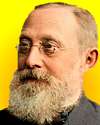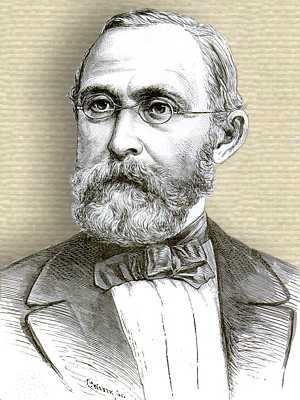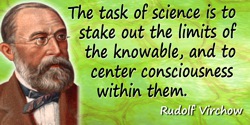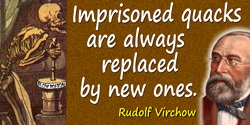 (source)
(source)
|
Rudolf Virchow
(13 Oct 1821 - 5 Sep 1902)
German pathologist and statesman who originated the concept that disease arises in the individual cells of a tissue and, with publication of his Cellular Pathology (1858), founded the science of cellular pathology.
|
PROFESSOR RUDOLF VIRCHOW.
from Popular Science Monthly (Oct 1882)
[p.836] PROFESSOR RUDOLF VIRCHOW is almost equally well known as the leader of one of the principal German schools of scientific thought and as a prominent actor in the field of German politics. In the former capacity his name is inseparably associated with the theory of cellular pathology, which he first expounded and which he has maintained with eminent consistency; in the latter character he has gained an honorable fame as a faithful guardian of the municipal [p.837] interests of the city of Berlin, and as a brave and outspoken parliamentary leader on the side of liberality and progress.
Professor Virchow was born at Schievelbein, in Pomerania, on the 13th of October, 1821. He studied medicine at the Frederick-Wilhelms Institute in Berlin, and was graduated in that faculty from the University of Berlin in 1843. He was made prosector of the Charité Hospital in 1846, and in the following year was appointed a regular lecturer in the university. In 1848 he was commissioned by the Government to visit Upper Silesia and study the typhus fever which was prevailing there as an epidemic, the result of misery and starvation. His report on this subject commanded attention at once, and is still held in high esteem by the medical profession and by all who are concerned with sanitary science.
To this period of Virchow’s life belongs the establishment of the “Archiv für pathologische Anatomie und Physiologie und für Klinische Medicin,” which was founded by Virchow and Reinhardt in 1848, and has been continued by Virchow since Reinhardt’s death in 1852; and of the “Medical Reform,” which he conducted in connection with Leubuscher in 1848 and 1849. The “Archiv” is still continued, under Virchow’s direction, and is recognized as one of the chief and authoritative medical journals of the world. To this period belongs also his entrance into active political life on the awakening of his republican enthusiasm by the revolutionary movements of 1848 and 1849. He formed a democratic club, became a popular orator, and was elected to a seat in the National Assembly, to which, however, he was not admitted, because he had not yet reached the age of eligibility. The reaction came on, and Herr Virchow, whose participation in the revolutionary movement was not agreeable to the powers whom it displaced for a time, and who had the control of the public positions he held, was removed from his lectureship. He could not, however, stay dispossessed; the medical societies insisted upon his recall, and he was reinstated by the force of his obvious fitness for his position. He accepted an invitation to the chair of Pathological Anatomy at the University of Würzburg, and removed there. The Government, however, could not spare him from Berlin, and Herr Manteuffel called him back to his old chair in the university in 1856. He then became director of the newly founded Pathological Institute, and soon raised it to the first rank among such establishments, and made it a center of independent investigations for numerous young students. While at Würzburg he published his “Collection of Contributions to Scientific Medicine,” of which the leading paper, on “The Movement in Favor of Unity in Scientific Medicine,” which, previously published separately, had already attracted much attention from the scientific world, revealed the tendencies and direction of thought by which his subsequent career was to be determined. Professor Virchow’s most distinguished services to science have been given in the [p.838] field of pathological anatomy, in which he is generally recognized as the founder of the theory of cellular pathology. The character and value of his work in this field are reviewed by Professor Jacobi, of this city, in his address before the New York College of Physicians and Surgeons. He remarks that, before and about the time when Virchow was preparing to commence his career, medical science in Germany was by no means independent and self-governing. There was no country in Europe in which observation and regard for facts, and facts only, were less esteemed than in Germany. England had enjoyed a predilection for pathological anatomy since John Hunter. France had lived through its most brilliant medical career, and could show a roll of illustrious, sober, and painstaking men, whose successful labors had placed the medical science of that country far above the level of any other. “Meanwhile, German medicine was controlled by what was called philosophy, and mainly by the so-called philosophy of nature. …Everything in medicine, not accepted because it was old and traditional, was a matter of speculation a priori only. The bases of speculation were premises construed by reasoning, not founded on facts; by theories not built on experience, far less on experimentation. Both facts and experimentation were claimed by Virchow as the only admissible foundations of scientific medicine, no matter how long it would take to collect them or to establish them. At the same time he was perfectly well aware that the literature of the last two thousand years contained a great many available points; nobody ever was more honest in collecting material or giving credit.”
Virchow wrote in the first volume of his “Archiv,” in 1847: “We ought not to deceive ourselves or each other in regard to the present condition of medical science. Unmistakably, medical men are sick of the large number of new hypothetical systems which are thrown aside as rubbish, only to be replaced by similar ones. We shall soon perceive that observation and experiments only have a permanent value. Then, not as the outgrowth of personal enthusiasm, but as the result of the labors of many close investigators, pathological physiology will find its sphere. It will prove the fortress of scientific medicine, the outworks of which are pathological anatomy and clinical research.”
The cell had been discovered to be the fundamental basis, by Schleiden, of the vegetable, and, by Schwann, of the animal tissues. Virchow, after a series of observations and experiments, became convinced that the cell had the power of propagating and multiplying itself within the individual, and proved that it is the physical body “with which the action of mechanical substance is connected, and within which the latter can retain its functions, which alone justify the name of life. Whatever outside of the cell acts upon it, works a mechanical or chemical change within it, which change is disorder or disease.” The external cause may excite a reaction within the cell, when it works as an irritant, or it may go without reaction, when [p.839] it is a simple lesion or a source of paralysis, the difference in results being dependent upon a difference in the condition of different cells. This difference in the condition of the cell forms its predisposition. Previous to this, the old humoral theories which regarded the whole compound mass had held more or less sway in medical practice, and the recognition of diseases as local anomalies had made but slow progress. A few workers, from Vesal and Paracelsus down, had gradually given shape to the local theory, and Virchow claimed that his cellular pathology was a consistent carrying out of the principles they had established. In it the localization of disease was taken as a necessity, and its seat was fixed in the smallest composing element, or the cell. Therapeutics have also undergone important changes in the light of this theory, and under the guidance of experimental methods, and have become vastly more exact and efficient, and local in application. Thus far, Dr. Jacobi asserts, every new discovery of pathological facts has found a ready explanation by the cellular theory and its methods. “The changes worked in and by the white blood-cells, the transmutation of epithelial cells into benign results or malignant growths, the influence, real or imaginary, worked by bacteria, have but strengthened its plausibility.”
An antagonism to Virchow has apparently been assumed by some of the partisans of the bacterial theory of infectious diseases which has no real basis for existence. No discrepancy need exist between a theory which regards disease as a disorder of the cells and the one which finds in the bacteria an external agency provoking and promoting cell-disorder. The publication of an essay on parasitic plants, in the first volume of Virchow’s “Pathology and Therapeutics,” in 1854, shows that his attention had been directed to the subject even then. In 1856, also, a paper was published by him, in the “Archiv,” on the botanical nature and classification of some forms of parasites to which an important part in nosology was to be attributed, on which occasion he invented and first used the term “mycosis,” which has since been generally adopted. Brauell’s papers on the bacterial parasite of anthrax, following up the researches of Davaine and Pollender, appeared in the eleventh and fourteenth volumes of the “Archiv,” and were followed by numerous papers in that and other journals. Obermeier found the spirochœte in the blood of relapsing fever, in Virchow’s hospital division, in 1873.
Virchow himself has said on this subject, in answer to an attack by his former pupil Klebs: “Vegetable and animal parasites are among the causes of disease. Their place is in etiology, and therefore it is easily conceived that, as Klebs expresses himself, they found no place in my cellular pathology. There it was not any more my domain to offer an extensive paper on parasites than it was to treat of traumatic injuries and corrosions. In my cellular pathology I meant to demonstrate the changes which take place in the elements of the [p.840] organism in the general forms of disease. Thus, I meant to build up a theory of the essentiality of disease. Specific causes were mentioned only as examples—for instance, intoxication; and, though but briefly alluded to, parasites have not been entirely overlooked.” His attitude toward Darwinism has been likewise misapprehended. Far from being an opponent of Darwinism, he should be regarded as one of its forerunners, for, as early as 1849, in his “Movement in Favor of Unity in Scientific Medicine,” he spoke of the origin of life as a mechanical necessity; and in 1858, a year before the publication of Darwin’s “Origin of Species,” he pointed, in an oration which was afterward printed in 1862, with three other orations on “Life” and “Disease,” to the changeability and transmutability of species as a necessary basis for the mechanical theory of life. But, when Haeckel insisted upon the inclusion of the theories of natural selection among the subjects to be taught in the public elementary schools, Virchow objected that only established facts and results, not theories, should be taught in the public schools.
To Haeckel’s contradictions of religious faith Virchow is able to return a tacit answer, by adhering to what he wrote more than thirty years ago, that “faith does not admit of a scientific discussion, for science and faith exclude each other. Not to such an extent, however, that one of them renders the other an impossibility, but in such a way that, within the range of science, there is no place for faith; and the latter can commence only where the former ends. It need not be denied that, if this boundary-line be respected, faith may have actual objects. It is not, therefore, the domain of science to attack faith or its objects; but its duty is to mark and consolidate the present termination of knowledge.”
Among the earlier papers written by Virchow and published in his first collections were some on different features and diseases of the skull and brain. These were followed by other cranial studies, and thus the physician was led to the study of anthropology, archæology, and paleontology. He was one of the founders of the German Archæological Society, which was organized at the meeting of the German naturalists at Innsprück in 1869, and he became the president of the society in 1870. He has also been the leader of the Berlin Anthropological Society since 1869, and has himself undertaken extensive and important researches. Having become engaged in a controversy with Quatrefages respecting the origin of the Prussian race (Quatrefages maintaining that it was of Finnic descent), he instituted those investigations, among the school-children of Germany, into the relative prevalence of blondes and brunettes, which have proved very interesting in their progress and results, and which have been taken up in other states. As a member of the Academy of Sciences, to which he was elected in 1873, he read important anthropological papers in 1875 and 1876; and in the latter year delivered an address at the meeting [p.841] of the German naturalists on the present position of anthropology, in which he maintained that that branch, although one of the youngest of the sciences, already occupied as advanced a position as many of the older branches of study. He opposed the idea that the people now lowest in development must necessarily fade away when they come into contact with civilization, and showed that it was contradicted by the history of the Europeans themselves. If the civilized people of the present day be considered as the product of a higher development, he said, we can not regard the possibility of such a development as a cause of the extinction of such people as are now on the same platform of culture which we ourselves once occupied. He took an active interest in the investigations of Dr. Schliemann in the Troad, and spent some time there, participating in the work, in 1879. He gave particular attention to the formations of the swamps in the neighborhood, and of the building-stones, and showed that they were all of fresh-water origin, thus conclusively putting to rest, it was held, the objections of those who, opposed to the view that Hissarlik represented the site of ancient Troy, that, at the time of the Trojan war, the place must have been covered by the sea, or too near it to permit the movements described in the Iliad. While here, he gave valuable medical aid to the people of the region.
Professor Virchow has labored actively for the spread of scientific knowledge among the people. He was for a long time a member of the body of instructors to the Berlin Workingmen’s Union, and in that capacity published, in connection with Holtzendorff, a collection of popular scientific treatises.
The scientific side, although there is enough of it to fill up an ordinary human life, is only one side of Professor Virchow’s career. His life is equally full on the political and practical side. Since 1859 he has been an alderman of the city of Berlin, and has in that capacity given conscientious attention to the details of the government and wants of the municipality. In direct reference to this office he has written many papers on subjects of hygiene, drainage, and sewerage, marked alike by scientific thoroughness and by adaptation to local wants. He was elected a member of the Prussian Chamber of Deputies in 1862, having the choice between the seats for three constituencies offered to him, and has served in that body with distinction ever since. He at once took the lead among those who opposed the arbitrary measures of Bismarck and his despotic assumptions; and has continued one of the most vigorous and formidable antagonists of that minister. In January, 1863, he proposed and secured the acceptance of an address accusing the ministers of having violated the constitution. In 1865 his opposition was so energetic that there was talk of Herr Bismarck’s challenging him to a duel. He did not, however, assume an extreme democratic position, but accepted the constitution with the reservation of the right of protest against objectionable measures which might be [p.842] proposed under it. The events of 1866 cast his party into the shade for a time, but he gradually resumed, in the enlarged Prussia, his opposition to the measures of military rule and centralization. In 1869 he made a proposition in favor of an international disarmament, which was of course rejected. He was elected a deputy to the Diet of the North-German Confederation, and afterward of the German Empire, but declined both calls on account of his objections to the constitutionality of those political creations. He, however, consented to enter the Reichstag in 1880, as a member from one of the conscriptions of Berlin. He was the author of the expression “Kulturkampf”—battle for culture—in connection with the controversy with the papal power, which was so long a political watchword in Germany. His political work, well performed as it was, was never allowed to interfere with his scientific pursuits, which he regarded as his proper and serious labor, but it often appeared to him, he says, “to be rather a recreation than otherwise.” In 1872 he replied with a refusal to an invitation by a German society to withdraw from the French scientific societies of which he was a member, declaring that a rupture of the scientific relations between the two countries would be contrary to the interests of civilization, of science, and of humanity. He was a member of the Sanitary Associations of Berlin during the wars of 1866 and 1870, organized the first Prussian sanitary train, and had a part in the organization of several military and other hospitals. He is the author of new laws in reference to the contagious diseases of animals and to fisheries. Last year he was one of the speakers at a public meeting to do honor to the memory of our murdered President, James A. Garfield.
Professor Virchow’s published works are numerous. A large proportion of them consist of special papers on medical subjects, many of which have appeared from time to time in the “Archiv,” or are included in the two collections of “Contributions to Scientific Medicine” (1857) and “Treatises connected with State Medicine and Epidemiology” (1879). Important studies of prevalent disorders and epidemics are embodied in his report on the famine in the Spessart (Bavaria), the typhoid fever in Silesia, and leprous affections in Norway, and in his essays on cholera and trichinosis. His “Cellular Pathology,” which forms the first volume of his “Lectures on Pathology,” in four volumes, has been translated into several languages. “The Pathology of Tumors” (three volumes, 1863−1867) is the most exhaustive and comprehensive work on that subject. Works of a more general character are “Goethe as a Naturalist” (1861), “National Development and the Importance of the Natural Sciences” (1865), “The Education of Women for their Vocation” (1865), “The Problems of the Natural Sciences in the New National Life of Germany” (1871), and “The Liberty of Science in the Modern State” (1877).
- Science Quotes by Rudolf Virchow.
- 13 Oct - short biography, births, deaths and events on date of Virchow's birth.
- Rudolf Virchow, Obituary - from Harper’s Weekly (1902).
- Collected Essays on Public Health & Epidemiology, by Rudolf Virchow. - book suggestion.








